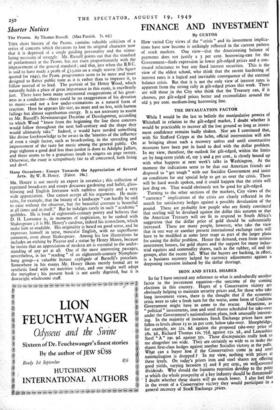Shorter Notices FINANCE AND INVESTMENT
By CUSTOS
How varied City views of the "crisis" and its investment implica- tions have now become is strikingly reflected in the current pattern of stock markets. One view—that the deteriorating balance of payments does not justify a 3 per cent. borrowing-rate for the Government—finds expression in lower gilt-edged prices and a con- tinued reluctance to buy any fixed interest securities. This is the view of the oldest school, who think that the recent hardening of interest rates is a logical and inevitable consequence of the external balance crisis. But that it is not the only view of interest rates is apparent from the strong rally in gilt-edged prices this week. There are still those .in the City who think that the Treasury can, if it chooses, put gilt-edged prices better and reconsolidate around the old 3 per cent. medium-long borrowing line.
THE DEVALUATION FACTOR
While I would be the last to belittle the manipulative powers of Whitehall in relation to the gilt-edged market, I doubt whether it would be practicable to recover all the lost ground so long as invest-
ment confidence remains badly shaken. Nor am I convinced that, with Sir Stafford Cripps at the helm, official intervention will aim at bringing about such a recovery unless and until constructive measures have been put in hand to deal with the dollar problem. In my view, therefore, the outlook for gilt-edged, within the limits set by long-term yields of, say 3 and 4 per cent., is closely bound up with what happens at next week's talks in Washington. At the moment the indications seem to be that our American friends are disposed to " get tough " with our Socialist Government and insist on conditions for any special help to get us over the crisis. There will be hard words spoken, and it could happen that the crisis will just drag on. That would obviously not be good for gilt-edged.
Turning to the other sections of the markets, City views of the "currency" implications of the crisis are clearly reflected in the search for satisfactory hedges against a possible devaluation of the pound. There are probably few people who are firmly convinced that sterling will be devalued against the dollar this autumn or that the American Treasury will see fit to respond to South Africa's suggestion that the dollar price of gold should be substantially increased. There are many people, however, who take the view that in one way or another present international exchange rates will have to be modified at some later stage as part of the larger plans for easing the dollar problem. Hence the demand, even from serious investment houses, for gold shares and the support for many indus- trial equities and commodity shares, such as the rubber, oil and tin groups, after the recent fall. What the buyers are backing, in effect, is a business recovery helped by currency adjustments against a deepening recession induced by the dollar shortage.
IRON AND STEEL SHARES
So far I have omitted any reference to what is undoubtedly another factor in the investment equation—the outcome of the coming elections in this country. Hopes of a Conservative victory are obviously helping to maintain security prices and, for those who take long investment views, there is the thought that if the economic crisis were to take a fresh turn for the worse, some form of Coalition Government might have to come to the rescue. Meantime, as " political " investments, iron and steel shares scheduled for take-over under the Government's nationalisation plans, look unusually interest- ing. In the majority of instances Stock Exchange prices have now fallen to levels about 15 to 20 per cent. below take-over. Sheepbridgc, for example, are 22s. 6d. against the proposed take-over price of 285. 3d., Richard Thomas 128. 7id. against 15s. 3d., and Lancashire Steel " A " 298. 9d. against 355. These discrepancies really look to me altogether too wide. They are certainly so wide as to make the shares first-class hedges against another Socialist victory at the polls. What can a buyer lose if the Conservatives come in and steel nationalisa,ion is dropped ? In my view, nothing with prices at these levels. On today's prices iron and steel shares are offering good yields, varying between 54 and 8 per cent., on well-covered dividends. Why should the business recession develop to the point at which the whole prosperity of a, key industry should be threatened? I doubt whether these shares will go much lower. I also feel that in the event of a Conservative victory they would participate in a general recovery of Stock Exchange prices.


































 Previous page
Previous page